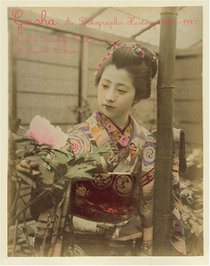Search -
Geisha: A Photographic History, 1872-1912
Geisha A Photographic History 18721912
Author:
Japanese geisha and courtesans intrigue and fascinate Westerners. During the mid-nineteenth century, Japan opened its doors to the world and became an essential destination for travelers. Tourists desired images of landscapes and traditional Japanese culture, which Japanese photographers provided. They created souvenir albums consisting of hand-... more »
Author:
Japanese geisha and courtesans intrigue and fascinate Westerners. During the mid-nineteenth century, Japan opened its doors to the world and became an essential destination for travelers. Tourists desired images of landscapes and traditional Japanese culture, which Japanese photographers provided. They created souvenir albums consisting of hand-... more »
ISBN-13: 9781576873366
ISBN-10: 1576873366
Publication Date: 12/2006
Pages: 118
Rating: 1
ISBN-10: 1576873366
Publication Date: 12/2006
Pages: 118
Rating: 1
4.5 stars, based on 1 rating
Genres:
- Arts & Photography >> Photography & Video >> General
- Arts & Photography >> Photography & Video >> Photo Essays
- Arts & Photography >> Photography & Video >> Photojournalism
- Arts & Photography >> Photography & Video >> Portraits
- Arts & Photography >> Photography & Video >> Equipment, Techniques & Reference >> General
- History >> Asia >> Japan
- Nonfiction >> Women's Studies >> History




